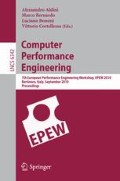Abstract
Markovian models play a pivotal role in system performance evaluation field. Several high level formalisms are capable to model systems consisting of some interacting sub-models, but often the resulting underlying process has a number of states that makes the computation of the solution unfeasible. Product-form models consist of a set of interacting sub-models and have the property that their steady-state solution is the product of the sub-model solutions considered in isolation and opportunely parametrised. The computation of the steady-state solution of a composition of arbitrary and possibly different types of models in product-form is still an open problem. It consists of two parts: a) deciding whether the model is in product-form and b) in this case, compute the stationary distribution efficiently. In this paper we propose an algorithm to solve these problems that extends that proposed in [14] by allowing the sub-models to have infinite state spaces. This is done without a-priori knowledge of the structure of the stochastic processes underlying the model components. As a consequence, open models consisting of non homogeneous components having infinite state space (e.g., a composition of G-queues, G-queues with catastrophes, Stochastic Petri Nets with product-forms) may be modelled and efficiently studied.
Access this chapter
Tax calculation will be finalised at checkout
Purchases are for personal use only
Preview
Unable to display preview. Download preview PDF.
References
Argent-Katwala, A.: Automated product-forms with Meercat. In: SMCtools 2006: Proc. of the 2006 Workshop on Tools for solving structured Markov Chains, Pisa, Italy, p. 10. ACM, New York (2006)
Balsamo, S., Dei Rossi, G., Marin, A.: A tool for the numerical solution of cooperating Markov chains in product-form. In: Proc. of HET-NETs 2010, Zakopane, PL, pp. 311–324 (2010)
Baskett, F., Chandy, K.M., Muntz, R.R., Palacios, F.G.: Open, closed, and mixed networks of queues with different classes of customers. J. ACM 22(2), 248–260 (1975)
Chao, X.: A queueing network model with catastrophes and product form solution. Operations Research Letters 18(2), 75–79 (1995)
Fourneau, J.M., Kloul, L., Quessette, F.: Multiclass G-networks with jumps back to zero. In: Proc. of MASCOTS 1995, Durham, NC, USA, pp. 28–32 (March 1995)
Fourneau, J.M., Quessette, F.: Computing the steady-state distribution of G-networks with synchronized partial flushing. In: Proc. of ISCIS, 21st International Symposium, Istanbul, Turkey, pp. 887–896 (2006)
Gelenbe, E.: Product form networks with negative and positive customers. Journal of Applied Prob. 28(3), 656–663 (1991)
Harrison, P.G.: Turning back time in Markovian process algebra. Theoretical Computer Science 290(3), 1947–1986 (2003)
Harrison, P.G.: Compositional reversed Markov processes, with applications to G-networks. Perform. Eval., Elsevier 57(3), 379–408 (2004)
Harrison, P.G., Lee, T.T.: Separable equilibrium state probabilities via time reversal in Markovian process algebra. Theoretical Computer Science 346(1), 161–182 (2005)
Hillston, J.: A Compositional Approach to Performance Modelling. PhD thesis, Department of Computer Science, University of Edinburgh (1994)
Jackson, J.R.: Jobshop-like queueing systems. Management Science 10, 131–142 (1963)
Kelly, F.: Reversibility and stochastic networks. Wiley, New York (1979)
Marin, A., Rota Bulò, S.: A general algorithm to compute the steady-state solution of product-form cooperating Markov chains. In: Proc. of MASCOTS 2009, London, UK, pp. 515–524 (September 2009)
Author information
Authors and Affiliations
Editor information
Editors and Affiliations
Rights and permissions
Copyright information
© 2010 Springer-Verlag Berlin Heidelberg
About this paper
Cite this paper
Balsamo, S., Dei Rossi, GL., Marin, A. (2010). A Numerical Algorithm for the Solution of Product-Form Models with Infinite State Spaces. In: Aldini, A., Bernardo, M., Bononi, L., Cortellessa, V. (eds) Computer Performance Engineering. EPEW 2010. Lecture Notes in Computer Science, vol 6342. Springer, Berlin, Heidelberg. https://doi.org/10.1007/978-3-642-15784-4_13
Download citation
DOI: https://doi.org/10.1007/978-3-642-15784-4_13
Publisher Name: Springer, Berlin, Heidelberg
Print ISBN: 978-3-642-15783-7
Online ISBN: 978-3-642-15784-4
eBook Packages: Computer ScienceComputer Science (R0)

